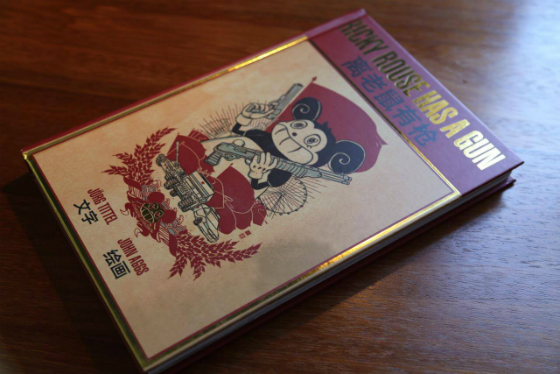TR Comic Review: Ricky Rouse Has a Gun
 |
We first meet American soldier Richard Rouse in “Buttfuck, Afghanistan,” dodging enemy fire, and in the graphic novel’s most annoyingly on-the-nose metaphor, reading a Dear John letter from his wife right as a huge bomb goes off. Walking away from everything, he hands his wedding ring to a local, and hikes for days until he has a long beard and finds himself in China, where he has trouble holding down simple factory work and paying rent.
But when he sees an opening for new employees at a Shanghai theme park full of hilarious knockoff attractions like Shrink Ogre, Crazy Birds, Carribean [sic]Pirates and Kangaroo Jock Bumpy Cars, his determination to get the job ends with him stalking the park manager, who is inspired by this dogged American to give a name to his newest bootleg cartoon mascot: Ricky Rouse.
The journey you think you’re on is one of a much more self-destructive version of Lost in Translation, with dirty sex, lots of drinking, irresponsible long-distance parenting and Rick developing a strange loyalty to his new home that he’s long-since lost for America, where he’d be tried as a deserter anyway. But then the story changes things up.
The son of the mayor of Shanghai wants to visit the park on Christmas day, which means lots of extra security, and Rick having to work on the one day his ex-wife and their daughter will be on a brief stopover in China. Rick oversleeps, and somehow manages to miss the part where terrorists dressed as park mascots seize all the tourists as hostages. Their leader, who wears a duck suit, explains that they want a hefty ransom for all the money China has robbed from the world by underselling and flooding the markets with cheap bootlegs.
From this moment on, it’s Die Hard in a Disney Derivative, though Rick Rouse is objectively a far worse person, husband and father than John McClane. In the carnage that ensues, east and west clash literally and figuratively, as an overriding theme emerges of what the difference is between rip-offs and re-appropriations – and where Rick himself fits on the scale.
Ironically, with its pro-China themes almost as conspicuous as those in Transformers 4, even if played satirically, this would be perfect fodder for an international blockbuster movie – that the comic is itself part of what it’s commenting on is not lost on writer Jorg Tittel. Perhaps the bigger issue than getting Disney not to sue, however, is the surprise identity of the villain – a “celebrity cameo” of sorts that only really works on the page, and even there threatens to derail the proceedings by making the fictional element more obvious.
I’d be astonished if it isn’t optioned nonetheless, even if Hollywood changes it as much as they did Wanted. I’ve always had the desire to see a good fight scene set on a roller coaster, and Ricky Rouse finally gave me one.
If you want to know more, check out Rickyleaks.org
